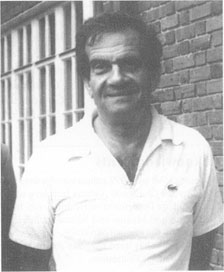Ernst Wynder, MD
1922 — 1999

Ernst Wynder was born in Herford, Germany and immigrated to the U.S. with his family in 1938, graduating from New York University and receiving his medical degree from Washington University in St. Louis in 1950.
Wynder arrived early on the academic scene as a result of his work as a medical student on a case-control study of lung cancer and tobacco smoking, for which he gathered data around the country under the aegis of the well-known surgeon, Evarts Graham.
There are many stories about the colorful life of Ernst Wynder, one being Graham’s skepticism about their study, as a heavy smoker himself, and later, criticism of the leading questions Wynder used to collect smoking histories. Nevertheless, that study of Wynder and Graham became a classic: “Tobacco smoking as a possible etiologic factor in bronchiogenic carcinoma. A study of 684 proven cases,” published in the JAMA, May 7, 1950.
Wynder pursued the laboratory study of carcinogenesis just as vigorously, and with Hoffman, devised standard animal experiments that determined over the years many of the tumor-causing products of tobacco smoke. He later carried out ecological studies of lifestyle, smoking, diet, and cancer, particularly in Japan.
His contributions to CVD epidemiology came as founder and head of the American Health Foundation where he oversaw a unit of the NIH Multiple Risk Factor Trial and where he pioneered in the design and implementation of health promotion strategies for school children, his “Know your Body” program becoming a model in the field. He put together the first international effort to define optimal blood lipid levels in 1979.
From his Foundation base he was an influential gadfly and incessant activist for improved training, research, and national policy in disease prevention and health promotion. Colleagues labeled him: “The health conscience of the nation.” (HB)
Sources
Henry Blackburn